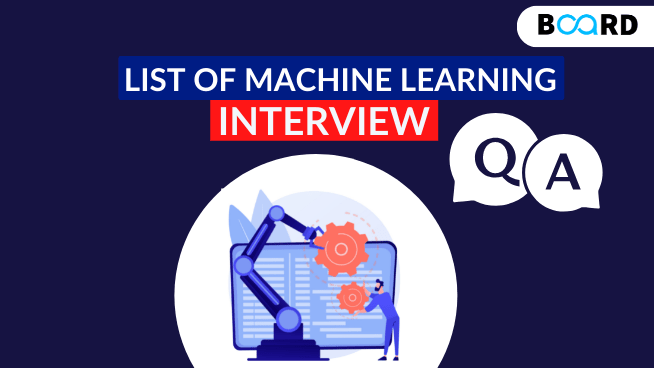
According to a report from TechRepublic, the demand for machine learning engineers has seen an explosion in the past two years. AI development and adoption continue to grow across industries.
Those applying for machine learning jobs can expect a number of different types of ML questions during an interview. Let’s look at different machine learning interview questions and answers that will be helpful for you when you apply for your next Machine Learning job.
1. What are the different types of Machine Learning?
This is one of the most common interview questions on machine learning asked by any interviewer. Below is one of the ways you can answer it.
Machine learning is of 3 types-- Supervised, Unsupervised, and Reinforcement Learning.
In supervised machine learning, the model makes predictions based on past data or labeled data. Labeled data means the data are given identifiers such as tags or labels, thus making it more meaningful.
Whereas, in unsupervised learning, there is an absence of such labeled data and the model identifies the relationship or patterns in the data.
Reinforcement learning, unlike the others, means that the model performs from memory, learning purely based on previous actions.
2. What would you do if there is missing or corrupted data?
This is the interviewer asking you an application-based question to check your ML fundamentals. One of the best ways to handle the issue of missing or corrupt data would be to replace the corrupted columns or rows with completely new values.
3. What are False Positives and False Negatives?
False positives are cases that wrongly get classified as True, but are actually False. False negatives are those cases that wrongly get classified as False, but are actually True. In the term ‘False Positive,’ the word ‘Positive’ refers to the row of the predicted value in the confusion matrix. The complete term indicates that the system has predicted the value as a positive, but the actual value is negative.
4. What is Deep Learning?
This is one of the basic machine learning interview questions, which is based on myths and misconceptions. The interview aims to check your knowledge of the basics of ML.
Deep learning is a subset of machine learning that has networks capable of unsupervised learning from data that is unstructured or unlabeled. It involves systems that think and learn like humans using artificial neural networks. The term ‘deep’ comes from the fact that you can have several layers of neural networks.
5. How would you decide which algorithm to use for a Dataset?
The choice of machine learning algorithm solely depends on the type of data that is available. If the data set exhibits linearity, then linear regression would be the best algorithm to use. If it has images and audio, then the deep learning algorithms would work the best.
If the data comprises non-linear interactions, then a boosting or bagging algorithm should be chosen. In short, there is no one algorithm as a thumb rule for all situations. It is based on your understanding of the concepts.
6. What do you think is more important - model accuracy or model performance?
Here, you must know that model accuracy is only a subset of model performance. The accuracy of the model and its performance are directly proportional and hence better the performance of the model, the more accurate are its predictions.
Conclusion
Good machine learning engineers need to have a variety of skills and should know how to fuse this knowledge into efficient coding.
With technology ramping up, jobs in the field of data science and AI will continue to be in demand. If you do your machine learning interview preparation well, then you will land one of the hottest jobs of the future!
If you want to learn more about interview preparation, check out the Board Infinity's completely free Interview preparation course, which gives you 15 hours of power-packed material to help you get ready for your Placements (or change in career path). It will help you build the right knowledge, skills, and attitude for being a step ahead in the selection process and ensure that you are corporate ready!
